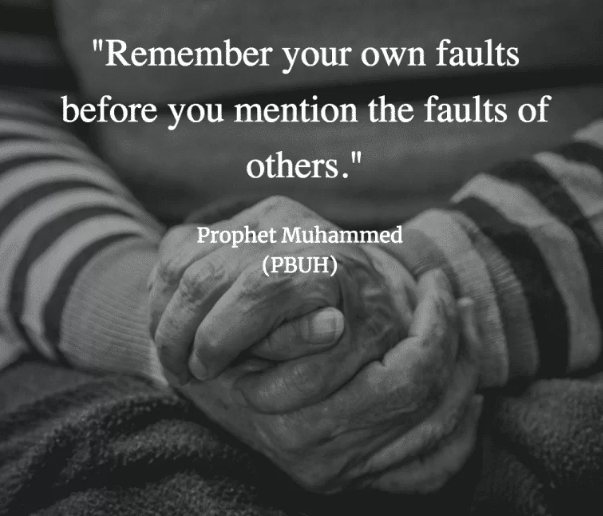Written by Ahmet Adam Asar
Faith requires us to bring out the best in ourselves and others. Treating others with honesty and respect is an indication of a believer. A Muslim is not permitted to disseminate stories, talk, or indulge in backbiting against another individual.
Gossip and backbiting are destructive behaviors that can cause significant harm to individuals and communities. In Islam, the religion encourages believers to uphold ethical values and avoid engaging in such negative practices. This article explores the detrimental effects of gossip and backbiting in Islam, drawing references from the Quran and Hadiths to emphasize the importance of refraining from these harmful actions.
The Qur’anic teachings instruct Muslims to validate their sources rather than indulge in guesswork. Muslims are repeatedly cautioned about the sins of the tongue in the Qur’an.
“Do not concern yourself with things about which you have no knowledge. Verily, your hearing, sight, and heart — all of them will be called to account” (Qur’an 17:36).
“Why do not the believing men and women, whenever such [a rumor] is heard, think the best of one another and say, “This is an obvious falsehood”?. . When you take it up with your tongues, uttering with your mouth something of which you have no knowledge, you deem it a light matter. Whereas in the sight of God, it is an awful thing!” (Qur’an 24: 12-15).
“Oh, you who believe! If a wicked person comes to you with any news, ascertain the truth, lest you harm people unwittingly, and afterward become full of repentance for what you have done (Qur’an 49:6).
“O you who believe! Let not some men among you laugh at others; it may be that the (latter) are better than the (former). Nor let some women laugh at others; it may be that the (latter is better than the (former). Nor defame nor be sarcastic to each other, nor call each other by (offensive) nicknames. Ill-seeming is a name connoting wickedness, (to be used of one) after he has believed. And those who do not desist are (indeed) doing wrong.
Oh, you who believe! Avoid suspicion as much (as possible), for suspicion in some cases is a sin. And spy not on each other behind their backs. Would any of you like to eat the flesh of his dead brother? No, you would abhor it…But fear Allah. For Allah is Oft-Returning, Most Merciful” (Qur’an 49:11-12).
This precise definition of the phrase “backbiting” is something we don’t typically consider, but it’s worth noting that the Qur’an considers it as repugnant as cannibalism.
Prophet Muhammad’s Teachings
The Prophet Muhammad provided many instances from his own life about how to deal with the sins of gossip and backbiting as a model and example for Muslims to follow. He began by defining the following terms:
The Prophet Muhammad once asked his followers, “Do you know what backbiting is?” They said, “Allah and His Messenger know best.” He continued, “Saying something about your brother that he dislikes.” Someone then asked, “What if what I say about my brother is true?” The Prophet Muhammad responded: “If what you say is true then you have backbitten about him, and if it is not true, then you have slandered him.”
Once a person asked the Prophet Muhammad for a description of what kind of good work would admit him into Paradise and distance him from the Hellfire. The Prophet Muhammad began to share with him a list of many good deeds, and then said: “Shall I inform you of the foundation of all of that?” He took hold of his own tongue and said, “Restrain yourself from this.” Surprised, the questioner exclaimed, “Oh, Prophet of Allah! Are we held to task for the things that we say?” The Prophet Muhammad replied: “Does anything topple people headlong into Hellfire, more than the harvests of their tongues?”
How to Avoid Backbiting and Gossip
These instructions may appear self-evident yet consider how backbiting and gossip continue to be the leading causes of personal relationship breakdown. It shatters friendships and families while instilling distrust among community members. Islam teaches us how to deal with our human proclivity for gossip and backbiting:

- Recognize that Allah sees and knows everything, although our understanding and perspective are limited.
- Recognize that no one is flawless; we all have flaws in some form.
- Recognize Shaytan’s desire to sow doubt and suspicion among believers.
- Speak clearly or remain silent. The Prophet Muhammad, peace be upon him, stated, “One can greatly beautify himself with two habits–good manners and lengthy silence.” On another occasion, he stated, “Let the one who believes in Allah and the Hereafter utter good words or let him remain silent.”
- If you hear a rumor about someone’s tragedy, try to be compassionate instead of spreading the rumor. Remind others not to gossip and move away if they don’t listen. In the Quran, Allah complimented such behavior, saying, “If they hear gossip, they walk away” (Quran 28:55).
- Avoid snooping. Spying encourages the exchange of secrets and misinformation, and it fosters a climate of distrust.
- Make excuses for other people. If someone does something that you believe is wrong in some manner, attempt to see the issue through the eyes of the other person. We are less inclined to focus on the negative and seek to discuss it with others if we do this.
- Repent to Allah for whatever errors you have made, and seek forgiveness from the person you have offended.
Did you aware that gossiping is the equivalent of devouring your dead brother’s flesh? It is a parable because gossiping degrades the honor of others, much like eating flesh. Ghibah is a despised being, as represented by the expression “the flesh of his dead brother.”
The person who is being rumored is called the dead since the person who has died cannot defend themselves. If a person does ghibah, the person who is being rumored will be helpless to defend themselves. The tale is mentioned so that His servants will be terrified and avoid ghibah’s acts.

1. Understanding Gossip and Backbiting
Gossip refers to the act of spreading rumors or discussing others’ private matters without their consent. Backbiting, on the other hand, involves speaking ill of someone in their absence, disclosing their faults, or revealing sensitive information that may harm their reputation. Both practices contribute to a toxic environment and erode trust among individuals.
2. Prohibition in the Quran:
The Quran, as the holy scripture of Islam, explicitly prohibits gossip and backbiting. Surah Al-Hujurat (Chapter 49, Verse 12) states, “O you who have believed, avoid much [negative] assumption. Indeed, some assumptions are sins. And do not spy or backbite each other. Would one of you like to eat the flesh of his brother when dead? You would detest it. And fear Allah; indeed, Allah is accepting of repentance and Merciful.”

3. Consequences of Gossip and Backbiting:
- Spreading Mistrust: When individuals indulge in gossip and backbiting, it creates an environment of suspicion and mistrust. People become wary of one another, fearing that their own flaws and weaknesses may be exposed in a similar manner.
- Negative Energy and Harmful Impacts: Gossip and backbiting not only harm the target individuals but also affect the overall atmosphere. They generate negative energy and contribute to a toxic environment that can hinder personal growth and community progress.
- Destruction of Relationships: Engaging in gossip and backbiting leads to broken bonds and shattered relationships. Trust is essential for fostering a healthy and supportive community, and these actions undermine that trust.
4. The Islamic Ethical Framework:
Islam emphasizes the importance of ethical conduct and positive communication. Prophet Muhammad (peace be upon him) said, “Whoever believes in Allah and the Last Day, let him speak good or remain silent.” This hadith highlights the significance of exercising restraint and refraining from engaging in harmful speech.

5. Seeking Forgiveness and Repentance:
Islam encourages believers to seek forgiveness and repentance for engaging in gossip and backbiting. By acknowledging their wrongdoing, individuals can strive for self-improvement and seek forgiveness from those they have harmed.
6. Constructive Communication and Positive Alternatives:
To combat gossip and backbiting, Islam promotes constructive communication and positive alternatives. Encouraging words, advice, and sincere discussions that aim to rectify issues in a respectful manner foster a healthier and more harmonious community.

Exceptions
There may be times when a narrative must be told, even if it is painful. Muslim scholars have identified six conditions in which it is permissible to spread rumors:
- When filing a complaint with a judge regarding an injustice that has occurred in order to reclaim one’s rights.
- To seek assistance to avoid committing a certain vice.
- To seek counsel from a Muslim scholar on whether specific conduct is permissible or prohibited. In this circumstance, one may bring up a specific situation without naming someone to acquire a decision on the matter.
- To identify a specific person.
- If someone openly acknowledges his sins, there is no harm in discussing them.
- To warn others against a specific individual. For example, we have an obligation to alert others about a known cheater or thief.
Gossip is a heinous behavior that damages both us and others. As a result, refrain from gossiping or listening to gossip. Maintain a good attitude even when those around us are gossiping.
According to Islam, gossiping causes many heart ailments such as envy, arrogance, dismissive of others, bad thinking, and so on.
Because you felt superior to others by gossiping about them, many heart illnesses developed. Furthermore, gossiping will cause an honor to be breached as well as the tranquility of the heart to be diminished.
Gluttony is a serious sin for both individuals who gossip about others and those who listen to the gossip.

Conclusion:
Gossip and backbiting have severe negative consequences on individuals and communities. Islam condemns these behaviors and provides a framework for believers to cultivate a culture of positive communication, trust, and respect. By understanding the teachings of the Quran and following the example of Prophet Muhammad (peace be upon him), Muslims can strive to eliminate gossip and backbiting from their lives, fostering a community based on compassion, unity, and forgiveness.

Declare Jihad
As Muslims, it is our duty to declare Jihad against unseen enemies that can deviate us from the right path. Following are the enemies that we must declare Jihad against:
1)Egoism
2) Arrogance
3) Conceit
4) Selfishness
5) Greed
6) Lust
7) Intolerance
8) Anger
9) Lying
10) Cheating
11) Gossiping
12) Backbiting
13) Slandering
If one masters and destroys these sins, then he or she will be ready to combat the enemy you can see.
